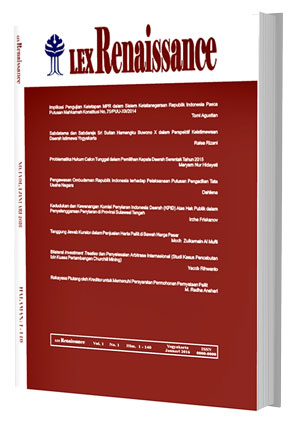Main Article Content
Abstract
Abstract
This study aims to determine the implications of the Constitutional Court Decision No. 69 / PUU-XII /
2015 and the legal consequences for making the marriage contract after the Constitutional Court ruling
on the status of property and third parties who feel aggrieved over the agreement. This study is a
normative by using approaches Act (statuteapproach) and the conceptual approach
(conseptualapproach).The data used is secondary data in the form of primary legal materials, secondary
and tertiary. The results showed that the implications of the Constitutional Court Decision No. 69 / PUU-
XIII / 2015 against the deed covenant marriage after the wedding before a Notary change the legal
mechanism of making the marriage contract that can now be created during the marriage bond takes
place by the Notary without preceded by court decision authorized. While the legal consequences of the
marriage covenant deed after mating before the Constitutional Court ruling that the changes to the
property status of husband and wife and binding upon both parties and against third parties. Later than
it was after the Constitutional Court the legal consequences of making the marriage contract after the
wedding on the status of joint property inherent (closely related) to the time of entry into force of the
agreement and binding on third parties.
Keywords: Marital agreement, the notary, the constitutional court's decision
Article Details
Authors who publish with this journal agree to the following terms:
a. Authors retain copyright and grant the journal right of first publication with the work simultaneously licensed under a Creative Commons Attribution License that allows others to share the work with an acknowledgement of the work's authorship and initial publication in this journal.
b. Authors are able to enter into separate, additional contractual arrangements for the non-exclusive distribution of the journal's published version of the work (e.g., post it to an institutional repository or publish it in a book), with an acknowledgement of its initial publication in this journal.
c. Authors are permitted and encouraged to post their work online (e.g., in institutional repositories or on their website) prior to and during the submission process, as it can lead to productive exchanges, as well as earlier and greater citation of published work (See The Effect of Open Access).



